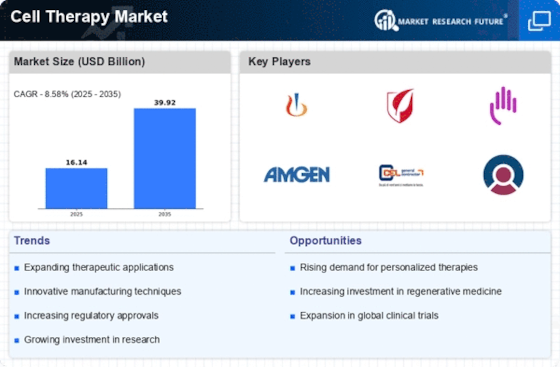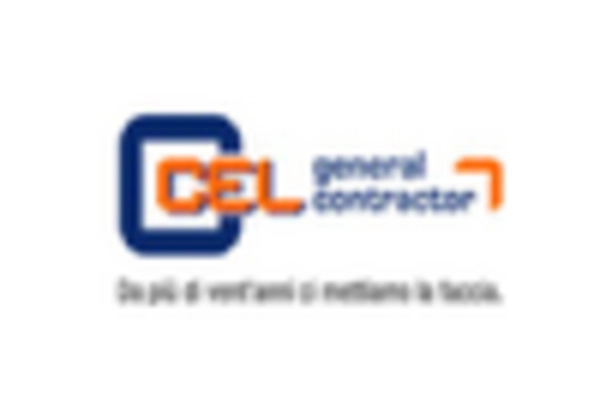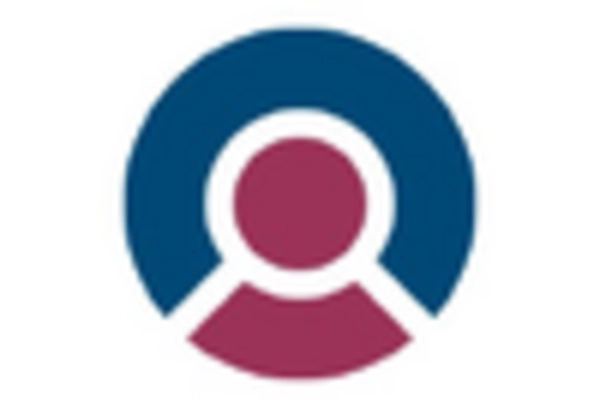Oncology
Cardiovascular Disease
Neurological Disorders
Orthopedic Disorders
Autologous Cell Therapy
Allogeneic Cell Therapy
Stem Cell Therapy
Intravenous Injection
Subcutaneous Injection
Intradermal Injection
Intramuscular Injection
Hospitals
Research Institutions
Ambulatory Surgical Centers
North America
Europe
South America
Asia Pacific
Middle East and Africa
North America Outlook (USD Billion, 2019-2035)
North America Cell Therapy Market by Application Type
Oncology
Cardiovascular Disease
Neurological Disorders
Orthopedic Disorders
North America Cell Therapy Market by Type
Autologous Cell Therapy
Allogeneic Cell Therapy
Stem Cell Therapy
North America Cell Therapy Market by Delivery Method Type
Intravenous Injection
Subcutaneous Injection
Intradermal Injection
Intramuscular Injection
North America Cell Therapy Market by End User Type
Hospitals
Research Institutions
Ambulatory Surgical Centers
North America Cell Therapy Market by Regional Type
US
Canada
US Outlook (USD Billion, 2019-2035)
US Cell Therapy Market by Application Type
Oncology
Cardiovascular Disease
Neurological Disorders
Orthopedic Disorders
US Cell Therapy Market by Type
Autologous Cell Therapy
Allogeneic Cell Therapy
Stem Cell Therapy
US Cell Therapy Market by Delivery Method Type
Intravenous Injection
Subcutaneous Injection
Intradermal Injection
Intramuscular Injection
US Cell Therapy Market by End User Type
Hospitals
Research Institutions
Ambulatory Surgical Centers
CANADA Outlook (USD Billion, 2019-2035)
CANADA Cell Therapy Market by Application Type
Oncology
Cardiovascular Disease
Neurological Disorders
Orthopedic Disorders
CANADA Cell Therapy Market by Type
Autologous Cell Therapy
Allogeneic Cell Therapy
Stem Cell Therapy
CANADA Cell Therapy Market by Delivery Method Type
Intravenous Injection
Subcutaneous Injection
Intradermal Injection
Intramuscular Injection
CANADA Cell Therapy Market by End User Type
Hospitals
Research Institutions
Ambulatory Surgical Centers
Europe Outlook (USD Billion, 2019-2035)
Europe Cell Therapy Market by Application Type
Oncology
Cardiovascular Disease
Neurological Disorders
Orthopedic Disorders
Europe Cell Therapy Market by Type
Autologous Cell Therapy
Allogeneic Cell Therapy
Stem Cell Therapy
Europe Cell Therapy Market by Delivery Method Type
Intravenous Injection
Subcutaneous Injection
Intradermal Injection
Intramuscular Injection
Europe Cell Therapy Market by End User Type
Hospitals
Research Institutions
Ambulatory Surgical Centers
Europe Cell Therapy Market by Regional Type
Germany
UK
France
Russia
Italy
Spain
Rest of Europe
GERMANY Outlook (USD Billion, 2019-2035)
GERMANY Cell Therapy Market by Application Type
Oncology
Cardiovascular Disease
Neurological Disorders
Orthopedic Disorders
GERMANY Cell Therapy Market by Type
Autologous Cell Therapy
Allogeneic Cell Therapy
Stem Cell Therapy
GERMANY Cell Therapy Market by Delivery Method Type
Intravenous Injection
Subcutaneous Injection
Intradermal Injection
Intramuscular Injection
GERMANY Cell Therapy Market by End User Type
Hospitals
Research Institutions
Ambulatory Surgical Centers
UK Outlook (USD Billion, 2019-2035)
UK Cell Therapy Market by Application Type
Oncology
Cardiovascular Disease
Neurological Disorders
Orthopedic Disorders
UK Cell Therapy Market by Type
Autologous Cell Therapy
Allogeneic Cell Therapy
Stem Cell Therapy
UK Cell Therapy Market by Delivery Method Type
Intravenous Injection
Subcutaneous Injection
Intradermal Injection
Intramuscular Injection
UK Cell Therapy Market by End User Type
Hospitals
Research Institutions
Ambulatory Surgical Centers
FRANCE Outlook (USD Billion, 2019-2035)
FRANCE Cell Therapy Market by Application Type
Oncology
Cardiovascular Disease
Neurological Disorders
Orthopedic Disorders
FRANCE Cell Therapy Market by Type
Autologous Cell Therapy
Allogeneic Cell Therapy
Stem Cell Therapy
FRANCE Cell Therapy Market by Delivery Method Type
Intravenous Injection
Subcutaneous Injection
Intradermal Injection
Intramuscular Injection
FRANCE Cell Therapy Market by End User Type
Hospitals
Research Institutions
Ambulatory Surgical Centers
RUSSIA Outlook (USD Billion, 2019-2035)
RUSSIA Cell Therapy Market by Application Type
Oncology
Cardiovascular Disease
Neurological Disorders
Orthopedic Disorders
RUSSIA Cell Therapy Market by Type
Autologous Cell Therapy
Allogeneic Cell Therapy
Stem Cell Therapy
RUSSIA Cell Therapy Market by Delivery Method Type
Intravenous Injection
Subcutaneous Injection
Intradermal Injection
Intramuscular Injection
RUSSIA Cell Therapy Market by End User Type
Hospitals
Research Institutions
Ambulatory Surgical Centers
ITALY Outlook (USD Billion, 2019-2035)
ITALY Cell Therapy Market by Application Type
Oncology
Cardiovascular Disease
Neurological Disorders
Orthopedic Disorders
ITALY Cell Therapy Market by Type
Autologous Cell Therapy
Allogeneic Cell Therapy
Stem Cell Therapy
ITALY Cell Therapy Market by Delivery Method Type
Intravenous Injection
Subcutaneous Injection
Intradermal Injection
Intramuscular Injection
ITALY Cell Therapy Market by End User Type
Hospitals
Research Institutions
Ambulatory Surgical Centers
SPAIN Outlook (USD Billion, 2019-2035)
SPAIN Cell Therapy Market by Application Type
Oncology
Cardiovascular Disease
Neurological Disorders
Orthopedic Disorders
SPAIN Cell Therapy Market by Type
Autologous Cell Therapy
Allogeneic Cell Therapy
Stem Cell Therapy
SPAIN Cell Therapy Market by Delivery Method Type
Intravenous Injection
Subcutaneous Injection
Intradermal Injection
Intramuscular Injection
SPAIN Cell Therapy Market by End User Type
Hospitals
Research Institutions
Ambulatory Surgical Centers
REST OF EUROPE Outlook (USD Billion, 2019-2035)
REST OF EUROPE Cell Therapy Market by Application Type
Oncology
Cardiovascular Disease
Neurological Disorders
Orthopedic Disorders
REST OF EUROPE Cell Therapy Market by Type
Autologous Cell Therapy
Allogeneic Cell Therapy
Stem Cell Therapy
REST OF EUROPE Cell Therapy Market by Delivery Method Type
Intravenous Injection
Subcutaneous Injection
Intradermal Injection
Intramuscular Injection
REST OF EUROPE Cell Therapy Market by End User Type
Hospitals
Research Institutions
Ambulatory Surgical Centers
APAC Outlook (USD Billion, 2019-2035)
APAC Cell Therapy Market by Application Type
Oncology
Cardiovascular Disease
Neurological Disorders
Orthopedic Disorders
APAC Cell Therapy Market by Type
Autologous Cell Therapy
Allogeneic Cell Therapy
Stem Cell Therapy
APAC Cell Therapy Market by Delivery Method Type
Intravenous Injection
Subcutaneous Injection
Intradermal Injection
Intramuscular Injection
APAC Cell Therapy Market by End User Type
Hospitals
Research Institutions
Ambulatory Surgical Centers
APAC Cell Therapy Market by Regional Type
China
India
Japan
South Korea
Malaysia
Thailand
Indonesia
Rest of APAC
CHINA Outlook (USD Billion, 2019-2035)
CHINA Cell Therapy Market by Application Type
Oncology
Cardiovascular Disease
Neurological Disorders
Orthopedic Disorders
CHINA Cell Therapy Market by Type
Autologous Cell Therapy
Allogeneic Cell Therapy
Stem Cell Therapy
CHINA Cell Therapy Market by Delivery Method Type
Intravenous Injection
Subcutaneous Injection
Intradermal Injection
Intramuscular Injection
CHINA Cell Therapy Market by End User Type
Hospitals
Research Institutions
Ambulatory Surgical Centers
INDIA Outlook (USD Billion, 2019-2035)
INDIA Cell Therapy Market by Application Type
Oncology
Cardiovascular Disease
Neurological Disorders
Orthopedic Disorders
INDIA Cell Therapy Market by Type
Autologous Cell Therapy
Allogeneic Cell Therapy
Stem Cell Therapy
INDIA Cell Therapy Market by Delivery Method Type
Intravenous Injection
Subcutaneous Injection
Intradermal Injection
Intramuscular Injection
INDIA Cell Therapy Market by End User Type
Hospitals
Research Institutions
Ambulatory Surgical Centers
JAPAN Outlook (USD Billion, 2019-2035)
JAPAN Cell Therapy Market by Application Type
Oncology
Cardiovascular Disease
Neurological Disorders
Orthopedic Disorders
JAPAN Cell Therapy Market by Type
Autologous Cell Therapy
Allogeneic Cell Therapy
Stem Cell Therapy
JAPAN Cell Therapy Market by Delivery Method Type
Intravenous Injection
Subcutaneous Injection
Intradermal Injection
Intramuscular Injection
JAPAN Cell Therapy Market by End User Type
Hospitals
Research Institutions
Ambulatory Surgical Centers
SOUTH KOREA Outlook (USD Billion, 2019-2035)
SOUTH KOREA Cell Therapy Market by Application Type
Oncology
Cardiovascular Disease
Neurological Disorders
Orthopedic Disorders
SOUTH KOREA Cell Therapy Market by Type
Autologous Cell Therapy
Allogeneic Cell Therapy
Stem Cell Therapy
SOUTH KOREA Cell Therapy Market by Delivery Method Type
Intravenous Injection
Subcutaneous Injection
Intradermal Injection
Intramuscular Injection
SOUTH KOREA Cell Therapy Market by End User Type
Hospitals
Research Institutions
Ambulatory Surgical Centers
MALAYSIA Outlook (USD Billion, 2019-2035)
MALAYSIA Cell Therapy Market by Application Type
Oncology
Cardiovascular Disease
Neurological Disorders
Orthopedic Disorders
MALAYSIA Cell Therapy Market by Type
Autologous Cell Therapy
Allogeneic Cell Therapy
Stem Cell Therapy
MALAYSIA Cell Therapy Market by Delivery Method Type
Intravenous Injection
Subcutaneous Injection
Intradermal Injection
Intramuscular Injection
MALAYSIA Cell Therapy Market by End User Type
Hospitals
Research Institutions
Ambulatory Surgical Centers
THAILAND Outlook (USD Billion, 2019-2035)
THAILAND Cell Therapy Market by Application Type
Oncology
Cardiovascular Disease
Neurological Disorders
Orthopedic Disorders
THAILAND Cell Therapy Market by Type
Autologous Cell Therapy
Allogeneic Cell Therapy
Stem Cell Therapy
THAILAND Cell Therapy Market by Delivery Method Type
Intravenous Injection
Subcutaneous Injection
Intradermal Injection
Intramuscular Injection
THAILAND Cell Therapy Market by End User Type
Hospitals
Research Institutions
Ambulatory Surgical Centers
INDONESIA Outlook (USD Billion, 2019-2035)
INDONESIA Cell Therapy Market by Application Type
Oncology
Cardiovascular Disease
Neurological Disorders
Orthopedic Disorders
INDONESIA Cell Therapy Market by Type
Autologous Cell Therapy
Allogeneic Cell Therapy
Stem Cell Therapy
INDONESIA Cell Therapy Market by Delivery Method Type
Intravenous Injection
Subcutaneous Injection
Intradermal Injection
Intramuscular Injection
INDONESIA Cell Therapy Market by End User Type
Hospitals
Research Institutions
Ambulatory Surgical Centers
REST OF APAC Outlook (USD Billion, 2019-2035)
REST OF APAC Cell Therapy Market by Application Type
Oncology
Cardiovascular Disease
Neurological Disorders
Orthopedic Disorders
REST OF APAC Cell Therapy Market by Type
Autologous Cell Therapy
Allogeneic Cell Therapy
Stem Cell Therapy
REST OF APAC Cell Therapy Market by Delivery Method Type
Intravenous Injection
Subcutaneous Injection
Intradermal Injection
Intramuscular Injection
REST OF APAC Cell Therapy Market by End User Type
Hospitals
Research Institutions
Ambulatory Surgical Centers
South America Outlook (USD Billion, 2019-2035)
South America Cell Therapy Market by Application Type
Oncology
Cardiovascular Disease
Neurological Disorders
Orthopedic Disorders
South America Cell Therapy Market by Type
Autologous Cell Therapy
Allogeneic Cell Therapy
Stem Cell Therapy
South America Cell Therapy Market by Delivery Method Type
Intravenous Injection
Subcutaneous Injection
Intradermal Injection
Intramuscular Injection
South America Cell Therapy Market by End User Type
Hospitals
Research Institutions
Ambulatory Surgical Centers
South America Cell Therapy Market by Regional Type
Brazil
Mexico
Argentina
Rest of South America
BRAZIL Outlook (USD Billion, 2019-2035)
BRAZIL Cell Therapy Market by Application Type
Oncology
Cardiovascular Disease
Neurological Disorders
Orthopedic Disorders
BRAZIL Cell Therapy Market by Type
Autologous Cell Therapy
Allogeneic Cell Therapy
Stem Cell Therapy
BRAZIL Cell Therapy Market by Delivery Method Type
Intravenous Injection
Subcutaneous Injection
Intradermal Injection
Intramuscular Injection
BRAZIL Cell Therapy Market by End User Type
Hospitals
Research Institutions
Ambulatory Surgical Centers
MEXICO Outlook (USD Billion, 2019-2035)
MEXICO Cell Therapy Market by Application Type
Oncology
Cardiovascular Disease
Neurological Disorders
Orthopedic Disorders
MEXICO Cell Therapy Market by Type
Autologous Cell Therapy
Allogeneic Cell Therapy
Stem Cell Therapy
MEXICO Cell Therapy Market by Delivery Method Type
Intravenous Injection
Subcutaneous Injection
Intradermal Injection
Intramuscular Injection
MEXICO Cell Therapy Market by End User Type
Hospitals
Research Institutions
Ambulatory Surgical Centers
ARGENTINA Outlook (USD Billion, 2019-2035)
ARGENTINA Cell Therapy Market by Application Type
Oncology
Cardiovascular Disease
Neurological Disorders
Orthopedic Disorders
ARGENTINA Cell Therapy Market by Type
Autologous Cell Therapy
Allogeneic Cell Therapy
Stem Cell Therapy
ARGENTINA Cell Therapy Market by Delivery Method Type
Intravenous Injection
Subcutaneous Injection
Intradermal Injection
Intramuscular Injection
ARGENTINA Cell Therapy Market by End User Type
Hospitals
Research Institutions
Ambulatory Surgical Centers
REST OF SOUTH AMERICA Outlook (USD Billion, 2019-2035)
REST OF SOUTH AMERICA Cell Therapy Market by Application Type
Oncology
Cardiovascular Disease
Neurological Disorders
Orthopedic Disorders
REST OF SOUTH AMERICA Cell Therapy Market by Type
Autologous Cell Therapy
Allogeneic Cell Therapy
Stem Cell Therapy
REST OF SOUTH AMERICA Cell Therapy Market by Delivery Method Type
Intravenous Injection
Subcutaneous Injection
Intradermal Injection
Intramuscular Injection
REST OF SOUTH AMERICA Cell Therapy Market by End User Type
Hospitals
Research Institutions
Ambulatory Surgical Centers
MEA Outlook (USD Billion, 2019-2035)
MEA Cell Therapy Market by Application Type
Oncology
Cardiovascular Disease
Neurological Disorders
Orthopedic Disorders
MEA Cell Therapy Market by Type
Autologous Cell Therapy
Allogeneic Cell Therapy
Stem Cell Therapy
MEA Cell Therapy Market by Delivery Method Type
Intravenous Injection
Subcutaneous Injection
Intradermal Injection
Intramuscular Injection
MEA Cell Therapy Market by End User Type
Hospitals
Research Institutions
Ambulatory Surgical Centers
MEA Cell Therapy Market by Regional Type
GCC Countries
South Africa
Rest of MEA
GCC COUNTRIES Outlook (USD Billion, 2019-2035)
GCC COUNTRIES Cell Therapy Market by Application Type
Oncology
Cardiovascular Disease
Neurological Disorders
Orthopedic Disorders
GCC COUNTRIES Cell Therapy Market by Type
Autologous Cell Therapy
Allogeneic Cell Therapy
Stem Cell Therapy
GCC COUNTRIES Cell Therapy Market by Delivery Method Type
Intravenous Injection
Subcutaneous Injection
Intradermal Injection
Intramuscular Injection
GCC COUNTRIES Cell Therapy Market by End User Type
Hospitals
Research Institutions
Ambulatory Surgical Centers
SOUTH AFRICA Outlook (USD Billion, 2019-2035)
SOUTH AFRICA Cell Therapy Market by Application Type
Oncology
Cardiovascular Disease
Neurological Disorders
Orthopedic Disorders
SOUTH AFRICA Cell Therapy Market by Type
Autologous Cell Therapy
Allogeneic Cell Therapy
Stem Cell Therapy
SOUTH AFRICA Cell Therapy Market by Delivery Method Type
Intravenous Injection
Subcutaneous Injection
Intradermal Injection
Intramuscular Injection
SOUTH AFRICA Cell Therapy Market by End User Type
Hospitals
Research Institutions
Ambulatory Surgical Centers
REST OF MEA Outlook (USD Billion, 2019-2035)
REST OF MEA Cell Therapy Market by Application Type
Oncology
Cardiovascular Disease
Neurological Disorders
Orthopedic Disorders
REST OF MEA Cell Therapy Market by Type
Autologous Cell Therapy
Allogeneic Cell Therapy
Stem Cell Therapy
REST OF MEA Cell Therapy Market by Delivery Method Type
Intravenous Injection
Subcutaneous Injection
Intradermal Injection
Intramuscular Injection
REST OF MEA Cell Therapy Market by End User Type
Hospitals
Research Institutions
Ambulatory Surgical Centers


















Leave a Comment